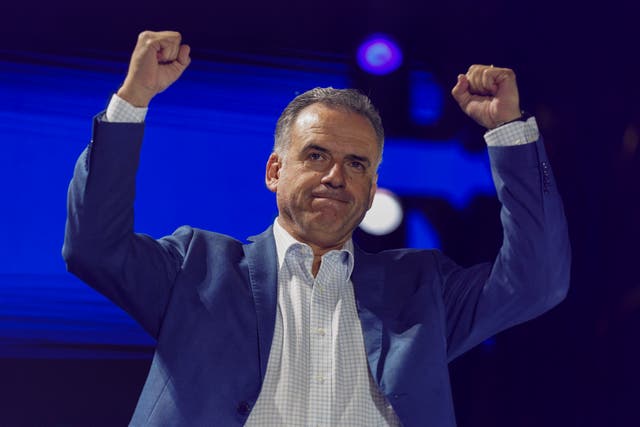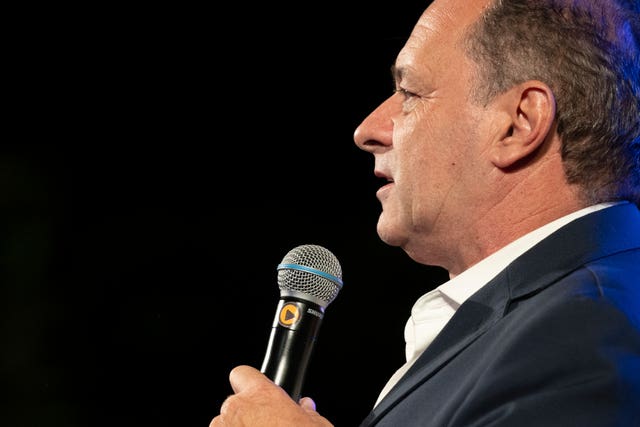
Uruguayans will return to the polls on Sunday for a second round of voting to choose their next president.
The conservative governing party and the left-leaning coalition are locked in a close run-off after failing to win an outright majority in last month’s vote.
The election has turned into a hard-fought race between Alvaro Delgado, the incumbent party’s candidate, and Yamandi Orsi from the Broad Front, a coalition of leftist and centre-left parties that governed for 15 years until the 2019 victory of centre-right President Luis Lacalle Pou.
It oversaw the legalisation of abortion, same-sex marriage and the sale of marijuana in the small South American nation.

Mr Orsi’s Broad Front took 44% of the vote while Mr Delgado’s National Party won just 27% in the first round of voting on October 27, but the other conservative parties that make up the government coalition — in particular, the Colorado Party — notched 20% of the vote collectively, enough to give Mr Delgado an edge over his challenger.
Congress ended up evenly split in the October vote. Most polls have shown a virtual tie with nearly 10% of Uruguayan voters undecided even at this late stage.
Analysts say the candidates’ lacklustre campaigns and broad consensus on key issues have helped generate extraordinary voter indecision and apathy in an election dominated by discussions about taxes and social spending, but largely free of the anti-establishment rage that has vaulted populist outsiders to power elsewhere.
Mr Delgado, 55, a rural veterinarian with a long career in the National Party, campaigned on a vow to continue the legacy of current President Lacalle Pou — in some ways making the election into a referendum on his leadership.
He campaigned under the slogan “re-elect a good government.”
While a string of corruption scandals briefly tainted the Lacalle Pou’s government last year, the president — who constitutionally cannot run for a second consecutive term — enjoys high approval ratings and a strong economy expected to grow 3.2% this year, according to the International Monetary Fund.

Mr Delgado served most recently as Secretary of the Presidency and promises to press on with his predecessor’s pro-business, market-friendly policies.
His coalition would likely continue pursuing a prospective trade deal with China that has raised hackles in Mercosur, an alliance of South American countries that promotes regional commerce.
Mr Orsi, 57, a former history teacher and two-time mayor from a working-class background, is widely seen as an heir to iconic former President Jose “Pepe” Mujica, a former Marxist guerilla who boosted Uruguay’s profile as one of the region’s most socially liberal and environmentally sustainable nations during his 2010-2015 term.
Promising to forge a “new left” in Uruguay, he has proposed tax incentives to lure investment and industrial policy to boost Uruguay’s critical agricultural sector.
He has also floated social security reforms that would buck the demographic trend in lowering the retirement age but fall short of a radical overhaul sought by Uruguay’s unions.


Why are you making commenting on The National only available to subscribers?
We know there are thousands of National readers who want to debate, argue and go back and forth in the comments section of our stories. We’ve got the most informed readers in Scotland, asking each other the big questions about the future of our country.
Unfortunately, though, these important debates are being spoiled by a vocal minority of trolls who aren’t really interested in the issues, try to derail the conversations, register under fake names, and post vile abuse.
So that’s why we’ve decided to make the ability to comment only available to our paying subscribers. That way, all the trolls who post abuse on our website will have to pay if they want to join the debate – and risk a permanent ban from the account that they subscribe with.
The conversation will go back to what it should be about – people who care passionately about the issues, but disagree constructively on what we should do about them. Let’s get that debate started!
Callum Baird, Editor of The National
Comments: Our rules
We want our comments to be a lively and valuable part of our community - a place where readers can debate and engage with the most important local issues. The ability to comment on our stories is a privilege, not a right, however, and that privilege may be withdrawn if it is abused or misused.
Please report any comments that break our rules.
Read the rules here